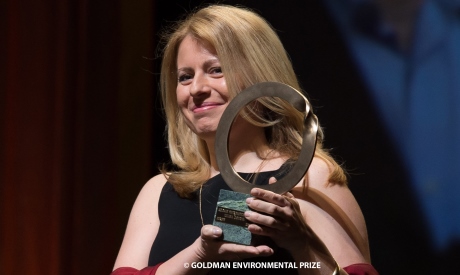Lawyers on the front line: Zuzana Caputova, ‘grassroots environmental hero’
Wednesday 20 July 2016
POLLY BOTSFORD
Zuzana Caputova, a public interest lawyer who won a decisive victory in the European Court of Justice (ECJ) over a highly controversial waste pit in Slovakia, was recently awarded the European category of the prestigious Goldman Environmental Prize, which honours ‘grassroots environmental heroes’.
Caputova, an advocate who works with a local NGO, Via Iuris, in Slovakia, and who was recently received in the White House for her work, is one of six winners for the 2016 Prize, known as the ‘environmental Nobel’. The prize focuses on individuals who have led positive change in the natural environment through community or citizen participation.
|

|
|
Zuzana Caputova.
Pic - Goldman Environmental Prize
|
Caputova’s win is in recognition of her successful efforts to close down a landfill site in Pezinok, a small town near Bratislava in Slovakia.
Those efforts, carried out over many years, ranged from public protests and petitions as well as the legal battle which went to the ECJ.
Caputova explains to Global Insight the importance of the Prize in raising awareness in Slovakia, a country that has the fifth worst track record in the EU on corruption according to Transparency International (TI). It provides the potential for citizens to fight against what she calls ‘entrenched interests’.
‘The Prize received a huge amount of media coverage across Slovakia and it really delivered a very important message that we, the common people, the public, can stand up to economic power – which is linked to political power. There are not that many positive messages that are so optimistic here,’ she says.
The prize focused on the case of Jozef Krizan & Ors v Slovenska inspeckcia zivoteneho prostredia (generally known as ‘the Pezinok landfill case'). A landfill was built in Pezinok, an area of vineyards. The waste site had public health consequences as well as potentially damaging the local wine-making industry.
‘‘Wherever there is this public interest there are important disclosure requirements so it is pretty surprising that this case was actually needed
Lina Pimentel, Partner, Mattos Filho, Veiga Filho, Marrey JR & Quiroga, Sao Paulo, and officer of the IBA’s Environment, Health and Safety Law Committee
When another landfill was proposed in 1999, there was huge opposition to what was seen as blatant corruption: local protesters argued that the family of the owner of the company, Ekologicka Skladka,which was behind it, was linked to one of the main political parties, SMER, and its local representatives in the town, and had directly influenced the regional offices to get the landfill approved. Throughout the 2000s, Pezinok’s citizens, with Via Iuris, opposed the second landfill.
The result was an ECJ case, which was not directly about the proposed landfill itself but turned on whether or not the public could access certain information relevant to the community (including the actual location of the proposed site).
The project owners argued the information was confidential. The court found in Pezinok’s favour, declaring that a party could not hide behind ‘the protection of the confidentiality of commercial or industrial information’ as a reason not to disclose information.
Caputova explains the importance of the decision for public participation in other cases in the future: ‘Parties will have access to relevant information from the beginning of the process’.
Lina Pimentel, a partner at Mattos Filho, Veiga Filho, Marrey JR & Quiroga in Sao Paulo, and an officer of the IBA’s Environment, Health and Safety Law Committee, points out that, in most jurisdictions, transparency on data is broadly accepted.
‘The vast majority of companies these days are fully aware of their obligations regarding data,’ she says. ‘Wherever there is this public interest there are important disclosure requirements so it is pretty surprising that this case was actually needed.’
Pimentel is, nevertheless, impressed by the level of public participation in the Pezinok case. ‘It is really important to have this level of public engagement on matters that affect natural resources. These are public assets and the communities need to be involved,’ she comments.
The case decision and the subsequent Prize have been a triumph for Pezinok.
‘We have just learnt in the last couple of weeks that the permissions that had been granted to the owners of the landfill site have been completely cancelled,’ says Caputova, speaking in July. ‘Since our victory in the ECJ in 2013, the grass has begun to grow again on that site.’
Caputova argues that the Prize comes at a crucial time in Slovakia’s history as the country is bogged down in problems of corruption, rule of law failings and a lack of public engagement. ‘We face serious problems of corruption and individuals buying justice,’ she says.
During the opposition to the site in the 2000s, the community faced ‘breaches of law, manipulation and lies, and conflicts of interest’ as well as ultimately ‘dismissal from participation in decision-making, as well as absurd court decisions'.
Ludwig Kramer is a senior lawyer with environmental public interest organisation Client Earth, and a former judge in Germany.
‘It makes no sense not to reveal the location of a landfill,’ he says. ‘This was an administration’s attempt to stop public participation: knowledge is power in these matters.’
Via Iuris is also now focusing its efforts on public participation and rule of law issues. ‘We are supporting citizens to be involved in public affairs and also trying to get rid of systemic failures of public power by campaigning and with in-depth analysis of new laws,’ says Caputova.
There has been some positive change in Slovakia, argues Gabriel Sipos, Director of TI in Slovakia, particularly in improved transparency.
‘Slovakia is the only country in the world to introduce a freedom of information law, which means that all public spending contracts must be put online before they are completed,’ he says. There is also now greater scrutiny of judicial decisions which have recently become available online.
Polly Botsford is a freelance journalist and can be contacted at polly@pollybotsford.com